Politics
Erdoğan urges joint action to end Gaza tragedy, restore Mideast peace
President Recep Tayyip Erdoğan on Tuesday urged NATO allies and the international community to take responsibility for ending Israeli violations and the humanitarian catastrophe in Gaza and restoring peace in the Middle East, warning that war and destruction offer no path forward for the region.
Speaking on the sidelines of the NATO Summit in The Hague, Erdoğan said diplomacy remains the only viable solution to the region’s enduring conflicts.
“The permanent resolution of problems with Iran is only possible through diplomacy and negotiation,” Erdoğan said. “Our region is full of examples showing that war and destruction lead nowhere.”
Condemning Israel’s massacres and blockade in Gaza, Erdoğan stressed the scale of the humanitarian catastrophe unfolding there.
“Due to Israel’s attacks, the humanitarian tragedy in Gaza has turned into a humanitarian disaster. No person with a conscience can remain silent in the face of such brutality,” he said.
The Turkish president said that 80% of Gaza has been destroyed and 95% of the health care infrastructure has been demolished, with more than 2 million Gazans struggling to survive under very difficult conditions amid the rubble, with bombs constantly falling down on them.
“The Israeli government is even blocking the entry of the most basic necessities into Gaza. Due to Israel’s blockades and attacks, the humanitarian tragedy in Gaza has turned into a humanitarian disaster. No conscientious person can remain silent in the face of such savagery. People stay silent when babies are sleeping, but not when babies are being killed,” he said.
“Like all countries in the region, Israel’s security depends on the stability, peace, and prosperity of its neighbors,” he said.
The Turkish president also called for shared responsibility among global powers to restore peace in the region.
“I believe that in order to establish peace in the Middle East, everyone, including our allies, must step up and take responsibility,” Erdoğan said.
Highlighting Türkiye’s contributions to NATO defense cooperation, Erdoğan noted that Ankara has taken the lead in pushing for the removal of barriers to defense industry trade among alliance members.
“As Türkiye, we led efforts to include in alliance documents the understanding that barriers to defense industry trade among NATO allies should be lifted,” he said.
Touching upon his diplomatic contacts during the NATO summit, including his meeting with Trump, German Chancellor Friedrich Merz, U.K.’s Prime Minister Keir Stammer, Dutch Prime Minister Dick Schoof, Romanian President Nicusor Don and French President Emmanuel Macron, Erdoğan said the meetings addressed the strengthening of bilateral ties with allies and the summit agenda, and Türkiye’s plan to host next year’s NATO summit is confirmed.
On Russia’s army leaving Azerbaijan, Erdoğan confirmed tha Russian forces had left and are no longer there.
He said he had recently visited Karabakh, and that Baku is working to make the region livable, investing heavily in infrastructure.
On whether NATO would defend Türkiye if a conflict arose between Türkiye and Israel, Erdoğan said there is currently no attack on Türkiye, which is “a peace-loving” country focused on maintaining regional peace.
Trump ‘sincere’ in push to deliver F-35s to Türkiye
Meanwhile, Erdoğan welcomed recent progress in discussions with the United States over the long-disputed delivery of F-35 fighter jets to Türkiye, saying that he discussed the issue directly with U.S. President Donald Trump during their meeting late Tuesday.
“We made payments of $1.3 to $1.4 billion for F-35s, and we saw that Mr. Trump was well-intentioned about delivering them,” Erdoğan said.
The president also emphasized that increased defense spending by NATO allies was a key outcome of the summit, but warned that budget increases alone would not ensure the alliance’s strength.
“Türkiye is the NATO ally most affected by terrorism and regional crises,” Erdoğan said. “We’ve made a great breakthrough in our defense industry and are working to enhance deterrence while staying clear of unnecessary conflict.”
He added that many allies were now aligning with Türkiye in taking on greater responsibility against shared threats, calling for “mutual understanding and sincere cooperation” to improve NATO’s effectiveness.
“It is not possible to strengthen the alliance solely by increasing defense spending,” he said.
Erdoğan attended the two-day NATO summit in the Netherlands alongside other heads of state, where leaders are discussing regional threats, alliance cohesion, and strategies to bolster NATO’s deterrence posture.
Politics
Turkish NGOs rally for humanitarian corridor into Gaza
Thousands of people gathered in the capital Ankara on Sunday for a major rally calling for a humanitarian corridor into the Palestinian enclave Gaza suffering under Israel’s genocidal attacks.
The rally, organized by the Ankara Palestine Solidarity Platform, a coalition of various nongovernmental organizations (NGOs), began after afternoon prayers at Kocatepe Mosque and concluded with a march to Parliament. Protesters carried banners reading “You cannot remain silent while children are dying” and “Humanitarian corridor to Gaza, now!” They voiced slogans against Israel.
Speaking on behalf of protesters, Ismail Mansur Özdemir said the ongoing blockade of Gaza had a horrible humanitarian toll. He said that a humanitarian intervention was necessary, though many people would likely continue to suffer from debilitating diseases and injuries. “We are seeing significant efforts around the world for opening a humanitarian aid corridor. As NGOs, we support noble efforts to break the Israeli blockade through convoys and vessels,” he said, referring to recent trips to Gaza by aid flotillas that were cut short by Israel’s intervention. Özdemir said that Türkiye, with its historic and moral responsibility, always sided with the oppressed in terms of humanitarian aid. “Establishing a humanitarian aid corridor into Gaza is a necessity, but Parliament should turn it into action. As NGOs, we appeal to Parliament to lead the creation of a humanitarian aid corridor by land, sea and air. All political parties should have a common will to that extent,” he said.
On Saturday, a similar rally to show support for Palestinians was held in Istanbul. Pro-Palestinian marches are commonplace in Türkiye, which strongly supports the Palestinian cause and Hamas’ resistance.
A U.N. official on Sunday warned the Security Council that Israel’s plans to control Gaza City risked “another calamity” with far-reaching consequences, as Israeli Prime Minister Benjamin Netanyahu insisted his goal was not to occupy the territory. The United Nations Security Council held a rare emergency weekend meeting after Israel said its military would “take control” of Gaza City in a plan approved by Netanyahu’s security cabinet that sparked a wave of global criticism. “If these plans are implemented, they will likely trigger another calamity in Gaza, reverberating across the region and causing further forced displacement, killings and destruction,” U.N. Assistant Secretary General Miroslav Jenca told the Security Council.
The U.N.’s humanitarian office, OCHA, said 98 children had died from acute malnutrition since the start of the conflict in October 2023, with 37 of those deaths since July, according to Gaza’s authorities.
“This is no longer a looming hunger crisis – this is starvation, pure and simple,” said OCHA’s coordination director Ramesh Rajasingham.
Palestine’s U.N. Ambassador Riyad Mansour said Sunday, “over 2 million victims are enduring unbearable agony,” calling Israel’s plans for Gaza City “illegal and immoral,” and urged foreign journalists to be allowed into Gaza.
Netanyahu announced on Sunday a plan to allow more foreign journalists to report inside Gaza, but accompanied by the Israeli military.
Britain, a close ally of Israel which nonetheless pushed for an emergency meeting on the crisis, warned the Israeli plan risked prolonging the conflict.
“It will only deepen the suffering of Palestinian civilians in Gaza. This is not a path to resolution. It is a path to more bloodshed,” said British deputy ambassador to the U.N. James Kariuki.
World Health Organization (WHO) chief Tedros Adhanom Ghebreyesus echoed that sentiment, calling the Israeli plan “deeply worrying, given the already dire humanitarian and health situation across the Strip.”
But Netanyahu said Sunday his country was “talking in terms of a fairly short timetable because we want to bring the war to an end,” as he insisted Israel did not want to occupy Gaza.
Outside the meeting at U.N. headquarters in New York, a small but noisy protest calling for an end to the conflict was met by a large police presence.
Algeria’s Ambassador Amar Bendjama called for sanctions on Israel in response to its Gaza City plan.
“The hour has come to impose sanctions on the enemy of humanity,” he said.
“If it were another country, you would have been imposing sanctions a long time ago,” the Palestinian envoy Mansour said.
Politics
‘Shady election’ trial overshadows Turkish opposition CHP’s annual congress
Türkiye’s main opposition Republican People’s Party (CHP) is entering its annual congress season under a cloud of scandal as a looming court case over alleged vote buying in last year’s leadership race continues to dominate the party’s agenda.
The district congress delegate elections are set to begin on Aug. 13, followed by district congresses between Sept. 13 and Oct. 5, and provincial congresses from Oct. 11 to Nov. 5. Yet, instead of focusing on the upcoming elections, party insiders say all eyes are on the Sept. 15 hearing in the so-called shady congress case.
The high-stakes trial targets 12 suspects, including Istanbul’s ousted Mayor Ekrem Imamoğlu, on charges of rigging the CHP’s 38th Ordinary Congress in November 2023.
Prosecutors accuse current chairperson Özgür Özel of “buying” delegate support to oust longtime leader Kemal Kılıçdaroğlu, with alleged bribes ranging from cash and houses to coveted municipal jobs. If the court annuls the congress, Özel’s leadership could be voided and a court-appointed trustee would take over Türkiye’s oldest political party until a new vote is held.
Sabah newspaper, citing party sources, wrote that the leadership’s decision to push ahead with the congress calendar before the hearing has sparked anger among the opposition wing, who view it as an attempt to cement control ahead of a possible annulment.
“In the past, congress season was exciting and competitive,” said a former CHP official. “Now, there’s no enthusiasm. Everyone is focused on the court case, and many believe the 2023 congress will be canceled.”
Some within the party fear the trial could even pave the way for Kılıçdaroğlu’s return, deepening divisions at a time when the CHP is already accused of corruption and backroom dealings. Should the court rule against the leadership, it would deal a major blow to the party’s credibility, particularly after last year’s local election gains.
Suppose the Sept. 15 hearing does not produce a damaging ruling. In that case, however, the provincial congresses in October are expected to see fierce power struggles, with tense confrontations between Özel’s camp and their emboldened opposition faction.
Until then, the CHP’s annual congress calendar remains overshadowed by a corruption trial that has cast doubt over the legitimacy of its current leadership and reignited old rivalries within Türkiye’s main opposition.
Politics
‘Terror-free Türkiye key to deepening Turkic world integration’
A Türkiye cleansed of terrorism will become a strategic threshold for greater economic, cultural and political unity across the Turkic world, the ruling Justice and Development Party (AK Party) Deputy Chair Kürşad Zorlu said Monday.
Speaking at the “Turkic World Relevant Institutions and Organizations Consultation Meeting” in Ankara, Zorlu, who also heads the party’s relations with Turkic states, said this vision aligns with President Recep Tayyip Erdoğan’s “Century of Türkiye” foreign policy goals.
“One of the most important pillars of the Century of Türkiye is building an institutional and multifaceted structure in relations with the Turkic world,” Zorlu said. “We are making a new beginning that will accelerate the Century of Turkic World.”
The meeting brought together 15 public institutions directly tied to the Turkic world, covering sectors from education and culture to diaspora affairs. Zorlu said the aim was to strengthen coordination, pool resources and unite around common projects.
Türkiye has been a driving force in the Organization of Turkic States (OTS), with Zorlu noting the bloc’s growing influence beyond its regional borders. The combined gross domestic product (GDP) of member states reached $2.1 trillion in 2024 and is expected to surpass $3 trillion by 2030, potentially making the OTS the eighth-largest economic bloc globally.
Trade among Turkic states has surged sixfold over the past two decades, while their share of global trade has risen by 70%, hitting 2.42% in 2024. Türkiye’s trade with its Turkic partners has grown fourteenfold since 2002, reaching $26 billion, with total intra-Turkic trade standing at $70.3 billion.
Investment ties are also strengthening. In 2002, there were virtually no companies with Turkic state capital in Türkiye; by March 2025, that number had risen to 5,405.
Zorlu said ongoing OTS initiatives, including efforts to enable identity and travel integration across member states, would further bind the region together.
“As Türkiye, we are determined to lead this process and move forward shoulder to shoulder with our sister states,” he said.
For Ankara, deepening ties with the Turkic world is not only an economic opportunity but also a geopolitical strategy to reinforce stability at home and project influence abroad, a role Zorlu argued will only grow once Türkiye fully eliminates terrorism.
Under the “terror-free Türkiye” initiative launched last year, the PKK terrorist group announced its dissolution in May. It began disarming last July, ending four decades of violence that claimed more than 40,000 lives in Türkiye, as well as in Iraq and Syria.
Politics
Greece’s closure of Western Thrace schools ‘assimilation plan’
The head of the Friendship, Equality, Peace (DEB) Party, Çiğdem Asafoğlu, on Monday, has accused Athens of systematically dismantling Turkish minority education in Western Thrace, warning that the closure of three more schools is part of a wider assimilation strategy in violation of international law.
Speaking to Anadolu Agency (AA), Asafoğlu stated that the Greek Education Ministry has pursued a policy for years of reducing class sizes or shutting down schools attended by the Turkish minority. This year, just before the start of the academic term, authorities closed schools in Kardere and Mehrikos in Rhodope, as well as in Hasanlar village in the Evros region.
She stressed that student numbers are deliberately reduced each year under the pretext of “low enrollment,” resulting in a decline from 210 minority primary schools two decades ago to just 83 today. “This is a demographic engineering project targeting cultural and identity assimilation,” she said, adding that such actions are “a crime under international law.”
Under the 1923 Lausanne Treaty, Turkish minority schools in Western Thrace are meant to have autonomous status. However, Asafoğlu said Athens applies the treaty selectively. “When it suits them, they invoke Lausanne against us. When we say ‘We are Turks’ and speak of the Turkish minority, they accuse us of violating Lausanne and being a national threat. But they breach the treaty whenever it benefits them,” she noted.
She argued that even if student numbers fall, minority schools cannot be shut down under Lausanne. Yet, once closed, schools never reopen despite official claims to the contrary. “In Musaköy and Hacı Mustafa villages, the student count later met the threshold, but the schools remained shut,” she said.
Asafoğlu accused Greece of depriving children of the right to mother-tongue education and encouraging them to attend Greek schools instead, offering transportation as an incentive. “That’s not a solution; it’s assimilation,” she said.
The DEB leader also rejected Greece’s claim that closures are temporary. “We know from experience this is permanent. It’s a calculated attempt to erode our cultural and linguistic heritage,” she said.
Beyond education, Asafoğlu warned that discriminatory policies extend to economics, agriculture and personal rights. “Greece is known as the cradle of democracy, yet when it comes to the Turkish minority in Western Thrace, democracy is absent. Laws are passed without consulting the minority’s legitimate representatives,” she said.
She vowed to continue challenging the closures through political and legal channels, including the European Parliament, where DEB holds representation. “We will not allow the Turkish people here to be assimilated or ignored. These rights are rooted in history and guaranteed under international agreements,” she said.
Asafoğlu also criticized the poor physical conditions of minority schools and the state’s refusal to improve facilities. “They want conditions to deteriorate so parents send children to Greek schools. This is part of a broader effort to reduce our numbers and change the region’s demographic makeup,” she concluded.
Some 150,000 Muslim Turks in Western Thrace, economically one of the poorest in Greece, have long complained about deteriorating conditions. Seeing the community as a “hostage” of its ties with Türkiye, the Greek government has committed numerous breaches of its treaty obligations and European Court of Human Rights (ECtHR) rulings over the years, including the closure of schools, the banning of Turkish-language education and refusing to legally allow the community to elect their religious leaders like muftis (Muslim clerics), which is also another treaty right.
Politics
Terror-free Türkiye plan proceeds with caution, focus on PKK’s future
The disarmament of the PKK terrorist group continues as the terror-free Türkiye initiative took a new turn with the establishment of a special parliamentary committee to discuss the process.
The group, titled the National Unity, Fraternity and Democracy Committee, held its second meeting on Friday and the closed session heard ministers of interior and national defense as well as head of intelligence organization. On Tuesday, it will hold its third meeting while media reports say more concrete steps from the PKK may come soon.
Those include the evacuation of Makhmur and Sinjar, two camps where PKK members and sympathizers reside in Iraq, setting up a legal framework for disarmed members of the group and the likely voluntary evacuation of the PKK’s senior figures to African or European countries.
The PKK started laying down weapons last month through a ceremony in northern Iraq’s Sulaymaniyah. Thirty members of the group, including senior leader Bese Hozat, burned their weapons in a cauldron in a well-publicized ceremony. Since then, little has been heard from the group except statements by some PKK leaders apparently expressing dissatisfaction with group’s decision to dissolve itself.
A report by Sabah newspaper published on Saturday says disarmament continues in secrecy, and Turkish officials closely monitor it and record the sites where arms were abandoned. Türkiye expects the process of disarmament to move forward faster than examples abroad, such as the disarmament of the ETA in Spain or the IRA in Ireland.
Soon, authorities expect the evacuation of Makhmur and Sinjar, both occupied by the PKK, sites that have hosted both Kurdish families and armed members of the terrorist group. The Makhmur camp is the oldest for PKK members and was set up in 1998 in the eponymous town. It primarily housed PKK sympathizers who left Türkiye in 1990s, as well as dangerous PKK members. Unconfirmed media reports say the PKK’s jailed leader, Abdullah Öcalan, sent a message to residents of the camp and urged them to prepare for imminent evacuation. The report by Sabah says families hailing from Türkiye who lived in Makhmur under the control of the PKK would be allowed to return home.
Türkiye is considering reintegration measures for PKK members not involved in any crimes and who volunteered to abandon arms, according to the Sabah report, but more than three dozen members of the group of senior cadres and some 300 members in lower ranks will not be allowed to return to Türkiye. These include PKK terrorists known to authorities and involved in masterminding or participating in acts of terrorism. Türkiye will allow them to stay in Iraq or Syria for a while but a permanent stay after the PKK’s full disarmament is out of question, according to the reports. The Sabah report also says they would be “advised” to leave for Europe or some African countries with good ties with Türkiye.
An outstanding issue in the initiative is the state of the YPG, the U.S.-backed Syrian wing of the terrorist group. The YPG insisted it was not a part of the disarmament but also failed to comply with a deal it signed with Damascus for integration into the Syrian army.
It is estimated that the YPG has up to 5,000 armed members. The U.S., which long supported the YPG under the pretext of a joint fight against the terrorist group Daesh, recently shifted its rhetoric and started openly supporting the YPG’s integration. Reports say the YPG may not stall its deal with Damascus more if Washington cuts off support and evacuate its military outpost in several northeastern Syrian towns occupied by the YPG.
In Ankara, Parliament will deal with the legal aspects of the initiative. Likely building upon the new committee’s recommendations, Parliament is expected to draft bills for the integration of disarmed PKK members to the society and their rehabilitation.
New legal regulations are required for PKK members to return to Türkiye, which designates it as a terrorist group. Quoting unnamed Turkish authorities, the Sabah report said Iraq is home to about 2,200 PKK members, while it is estimated around 200 terrorists are in hiding in Türkiye. Currently, some 5,000 people are incarcerated in Turkish prisons on charges related to the PKK and about 100 among them are elderly or suffering from debilitating diseases. A new amendment may particularly lead to the release of this second group as elderly and terminally ill prisoners are occasionally granted clemency.
Speaking before the last meeting of the parliamentary committee on Friday, Parliament Speaker Numan Kurtulmuş, who also chairs the committee, said they needed closed sessions due to the sensitive nature of the matter. Despite widespread support for the initiative as evidenced in recent opinion polls, authorities are worried that there might be attempts to undermine it, especially by far-right parties that oppose the initiative and foreign powers that used the PKK as a proxy group to advance their own goals, as the government has repeatedly pointed out.
“The committee is a historic step. In order to seize this great opportunity and, with the terrorist group now set to dissolve itself, to establish an environment where weapons, strife, and conflict are no longer discussed and where peace, brotherhood, and well-being take their place, our committee has a historic duty. I would like to thank everyone for the attitude shown during the commitee’s first meeting. Each of our colleagues expressed their views openly and in a highly respectful manner. The fact that our first decisions were adopted unanimously with the joint votes of all parties and all deputies participating in the commission is important for the committee’s success. From now on, I believe the spirit of unity displayed here will be important both for the negotiations and for the implementation of the decisions taken,” Kurtulmuş said.
“To make the most of this historic opportunity, we must proceed very carefully and express our views clearly. After all, those present in this room represent, in terms of votes, 98% of Türkiye. We are obliged to conduct this process with the sensitivity to meet the opinions and expectations of the people. There will be sessions in which very open and heated debates take place, but all of these will be the result of our shared intention to strengthen Türkiye’s national unity and solidarity. The consensus that emerges will please large segments of the public,” he said.
Kurtulmuş highlighted that the committee would oversee the legislative and regulatory arrangements that would emerge in connection with the process and would refer them to Parliament’s General Assembly for an ultimate decision and legislation.
Politics
Thousands attend Istanbul night rally to protest Gaza genocide
Istanbul’s Beyazıt Square was home to a major rally on Saturday evening against Israel’s ongoing genocide in Gaza and to protest the starvation Palestinians are exposed to.
Thousands of protesters, brought together by the Support to Palestine platform, which comprised the country’s prominent nongovernmental organizations (NGOs), marched toward Hagia Sophia Grand Mosque from the square, holding small lanterns and flashlights from their cellphones for the “Be A Light of Hope for Gaza” rally.
Participants sought to raise awareness of the humanitarian crisis and express solidarity with the people of Gaza amid escalating violence and severe shortages of food and medical supplies. Organizers called on the international community to take urgent action to end the suffering.
The crowd chanted slogans, “Killer Israel, Get out of Palestine” and “Children of Gaza, Wait For Us.” Among the participants was Ali Erbaş, head of the government’s Presidency of Religious Affairs (DIB), who recited prayers at the end of the rally. Others included Bilal Erdoğan, son of President Recep Tayyip Erdoğan, who also serves as chair of the board of trustees at a prominent NGO, Istanbul Governor Davut Gül, general secretary of the ruling Justice and Development Party (AK Party), Eyyüp Kadir Inan, Türkiye’s most popular drone maker Baykar’s chairperson, Selçuk Bayraktar, and heads of several labor unions.
After speeches, a young Palestinian girl recited a poem dedicated to Palestinians by the late Turkish poet Mehmet Akif Inan.
Israel has faced mounting outrage for its genocide in Gaza, where it has killed more than 61,000 people since October 2023. The military campaign has devastated the enclave and led to deaths by hunger and starvation.
Last November, the International Criminal Court (ICC) issued arrest warrants for Israeli Prime Minister Benjamin Netanyahu and his former Defense Minister Yoav Gallant for war crimes and crimes against humanity in Gaza.
Israel also faces a genocide case at the International Court of Justice (ICJ) for its war on the enclave.
Among the demonstrators was Canadian-born educator Jenny Molendyk Divleli, who said the situation has reached an ever more serious stage.
“Everybody’s aware that there’s genocide going on, but the situation now with the forced starvation of the Palestinian people is extra dire every day. You know, tens of people, even maybe hundreds, are dying, so we really need to make sure that we’re making noise and doing what we can,” she told Anadolu Agency (AA).
Raised in a conservative Christian family, Jenny converted to Islam in 2006 after extensive personal research.
Now living in Istanbul since 2012, she creates social media content – often with her five children – that explains topics like Islam and the life of the Prophet Muhammad in both English and Turkish, aimed especially at young audiences.
Divleli also noted what she sees as a global shift in attitudes toward Palestine.
“I do think that the general public opinion has changed globally. I think that more and more organizations are starting to speak up. We’re seeing news agencies change and people who have been in the media, who have been anti-Palestine, are now changing their opinions. I don’t think that it can be denied anymore, which makes me hopeful,” she said.
Mohammed Ben Elsheikh, a Tunisian protester who has lived in Istanbul for four years, told AA that the protests aim to amplify the voices of Gazans.
“First of all, I would like to send my greetings to our brothers in Gaza and Hamas. May God help them. We will soon be free,” he said.
He condemned the international community’s inaction.
“It is a shame that children are dying. All of Gaza is dying. A lot of things are happening – murder, starvation, imprisonment. The world is not moving. The presidents are not moving. We, as Muslim people, are moving. But this is not enough.”
-
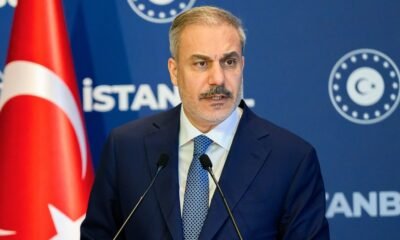
 Politics2 days ago
Politics2 days agoTurkish FM Fidan to visit Egypt to discuss Israel’s Gaza plan
-
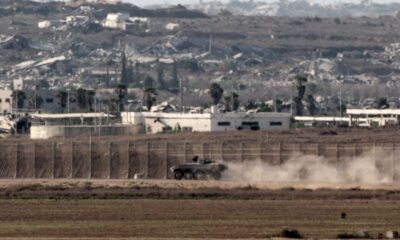
 Politics3 days ago
Politics3 days agoTürkiye urges int’l pressure to stop Israel’s Gaza plan
-
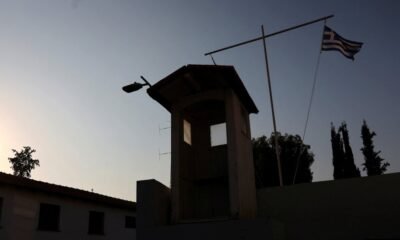
 Politics3 days ago
Politics3 days agoGreek Cypriot biker protest halts Lefkoşa border crossings
-
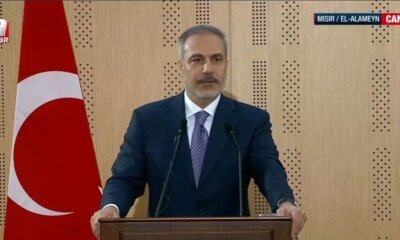
 Daily Agenda2 days ago
Daily Agenda2 days agoForeign Minister Fidan: Israel persistently sabotes cease -fire initiatives
-
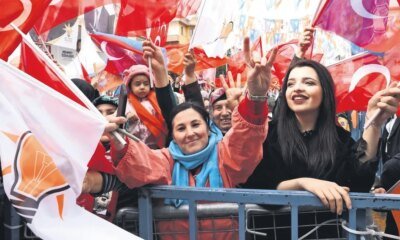
 Daily Agenda2 days ago
Daily Agenda2 days ago2 in Istanbul, 4 points in front of the CHP in front of Türkiye
-
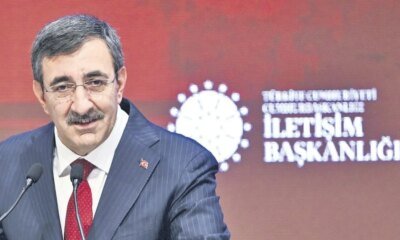
 Daily Agenda2 days ago
Daily Agenda2 days agoVice President Yılmaz: To create a chaos environment for their purpose
-
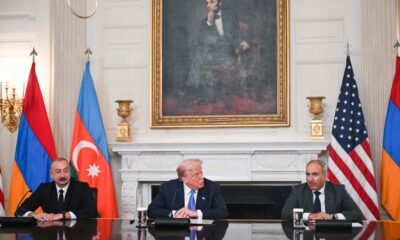
 Politics3 days ago
Politics3 days agoArmenia, Azerbaijan agree to groundbreaking peace agreement
-
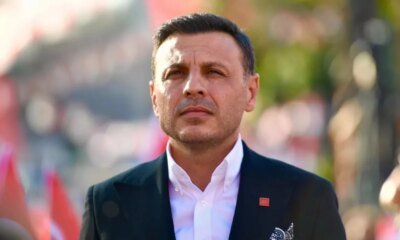
 Daily Agenda2 days ago
Daily Agenda2 days agoLawyer Mehmet Yıldırım and CHP Provincial Chairman Özgür Çelik Came Out




